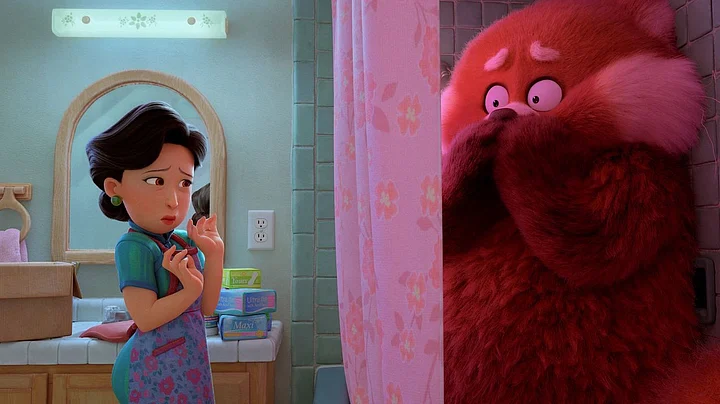As a nineties kid in an Indian metro city, I grew up watching Pixar films. I laughed and cried during Finding Nemo, sat on edge as the Incredibles went on their adventure, all as an excited pre-teen. But it was at 27 that I watched the first Pixar film that I could relate to – and wished that the teenage me had access to it.
Directed and co-written by Domee Shi, the first woman to solo-direct a feature at Pixar, Turning Red revolves around 13-year-old Chinese Canadian girl Mei Lee.
She morphs into a giant red panda – whenever she feels 'extreme' emotions – a blessing or curse (however you wish to see it) she inherited from her mother.
The film, set in 2002, is unapologetic as it takes you through Mei's coming-of-age journey – with the red panda being a metaphor for all things teenage girls experience. From periods to bodily changes, relationship between mothers and their girls, and most importantly how we deal with them all.
The 'Big Red Panda' in Every Room – Menstruation
I was 11 years old when I first got acquainted with the term 'periods'. On that day, my school, in Tamil Nadu's capital city Chennai, instructed girls in middle school to go to the auditorium, while boys were allowed an extra hour of PT. A sanitary napkin brand was conducting awareness campaign about menstruation, and curious boys who peeped through windows during the session were given detention.
It was then I realised something 'strange' was going to happen to my body. I was consumed by the fact that I would become 'grown up', but I did not want to.
But fate had other plans, and I started menstruating just one month after that awareness campaign, and that too when my mother was out of town.
Mei calls herself a 'red monster', the first time she transforms into a panda. The first time I spotted red, I burst out crying, because I too felt like a 'red monster.'
While Mei's mother Ling rushes in with period enforcements, her dad runs out with a panicked expression. I ran to my grandmother and aunts, because somewhere, deep inside my mind, I had internalised that boys (and my father) should not know about it.
"Mei Mei, I know this is upsetting. We are going to get through this together. I have ibuprofen, vitamin B, hot water bottle, and pads," Ling consoles her.
My mother too did just that – she held on as I cried on the phone. But, despite assurances from my mother and aunts, I was convinced that I should not have 'got it' so young.
Teenage SOS: The Bodily Changes
I am just acknowledging I did not even tell my closest friends that I have started my periods, because no one really discussed it – just like Mei doesn't initially tell her friends that she is turning into a red panda. It was a taboo topic.
"You are a woman now. And your body is going to change. There is nothing to be embarrassed about. We must take care of your delicate petals, and must clean them regularly," Mei's mother tells her, before she realises what is happening to her daughter.
I was a thin child, and grew up to be a small-built teenager. While people expressed surprise that "such a small child started menstruating", they also passed comments about how I did not "develop breasts" or "grow to be mature."
Again, I thought something that should ideally happen to people was not happening to me.
At one point in the film, Mei starts embracing her furry tail and bushy ears – rather than being embarrassed about it, she starts accepting and even liking who she is. This representation could have saved me some sleepless nights as a teenager.
The Revolving Relationship Between Mothers & Daughters
At the core of the film is the relationship between Mei and Ling. There is no villain, but exploration of the burden that women carry all through their lives to fit into perfect boxes.
Mei carries the weight to be the 'perfect daughter' – to get straight As, to help with household chores, to follow traditions, just like how her mother carried the same.
But what happens when Mei wants to be herself? What happens when she does not want to get rid of the 'giant red panda.' All daughters have some 'giant red panda' that we want to keep to ourselves – with or without our mothers' blessings.
As Mei grows to love her gang of dorky, feisty friends more than ever before, and has an obsession for a famous boy band, we also see a mother who is refusing to believe that her daughter is growing up – until something drastic happens. In Ling, we are compelled to see our own mothers.
"We've all got messy, loud, weird part of ourselves hidden away, and a lot of us never let it out," says Mei, in the film.
Not surprisingly, a few sections of people – read cishet men – have criticised the film of being 'unrelatable' and 'too mature', and not fit for viewing by children.
As someone who was a dorky teenager, with a protective mother, and wonderful friends, I can't care less about that. Yes, 13-year-olds have crushes, are mad about music and pop culture, and dream of their first kiss. Deal with it.
Mei and Ling are Chinese Canadians, but this is a universal story of mothers and teenage daughters – be it 2002 or 2022, Chennai or Toronto.
And as one of the million girls who has been in Mei's shoes, I would strongly recommend everyone – especially the jaded millennials – to watch this delightful film. It is something we would wish we saw as kids.
